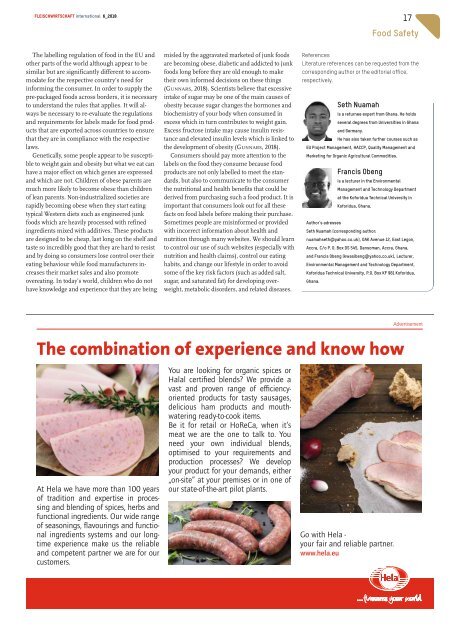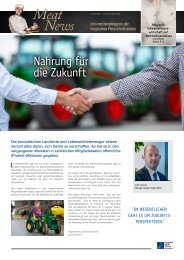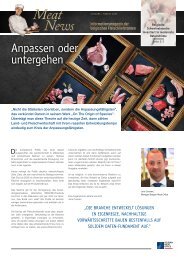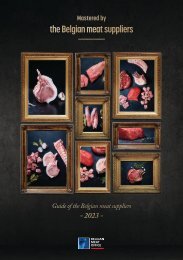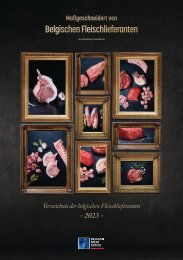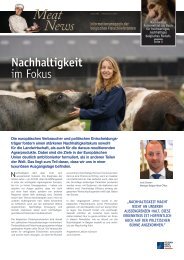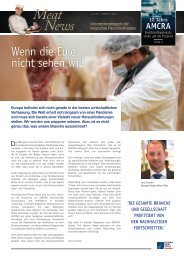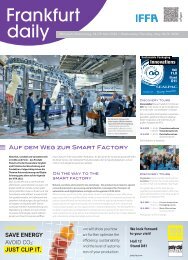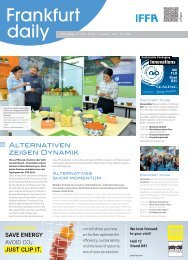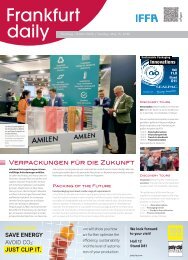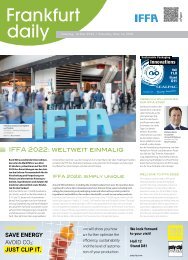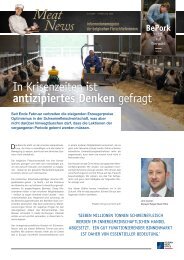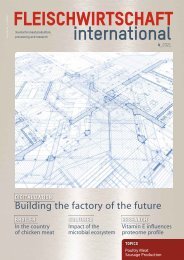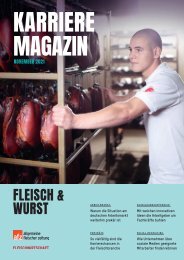FLEISCHWIRTSCHAFT international 6/2018
Create successful ePaper yourself
Turn your PDF publications into a flip-book with our unique Google optimized e-Paper software.
Fleischwirtschaft <strong>international</strong> 6_<strong>2018</strong><br />
17<br />
Food Safety<br />
The labelling regulation of food in the EU and<br />
other parts of the world although appear to be<br />
similar but are significantly different to accommodate<br />
for the respective country’s need for<br />
informing the consumer.Inorder to supply the<br />
pre-packaged foods across borders, it is necessary<br />
to understand the rules that applies. It will always<br />
be necessary to re-evaluate the regulations<br />
and requirements for labels made for food products<br />
that are exported across countries to ensure<br />
that they are in compliance with the respective<br />
laws.<br />
Genetically,some people appear to be susceptible<br />
to weight gain and obesity but what we eat can<br />
have amajor effect on which genes are expressed<br />
and which are not. Children of obese parents are<br />
much more likely to become obese than children<br />
of lean parents. Non-industrialized societies are<br />
rapidly becoming obese when they start eating<br />
typical Western diets such as engineered junk<br />
foods which are heavily processed with refined<br />
ingredients mixed with additives. These products<br />
are designed to be cheap, last long on the shelf and<br />
taste so incredibly good that they are hard to resist<br />
and by doing so consumers lose control over their<br />
eating behaviour while food manufacturers increases<br />
their market sales and also promote<br />
overeating. In today’s world, children who do not<br />
have knowledge and experience that they are being<br />
misled by the aggravated marketed of junk foods<br />
are becoming obese, diabetic and addicted to junk<br />
foods long before they are old enough to make<br />
their own informed decisions on these things<br />
(GUNNARS,<strong>2018</strong>). Scientists believe that excessive<br />
intake of sugar may be one of the main causes of<br />
obesity because sugar changes the hormones and<br />
biochemistry of your body when consumed in<br />
excess which in turn contributes to weight gain.<br />
Excess fructose intake may cause insulin resistance<br />
and elevated insulin levels which is linked to<br />
the development of obesity (GUNNARS,<strong>2018</strong>).<br />
Consumers should pay more attention to the<br />
labels on the food they consume because food<br />
products are not only labelled to meet the standards,<br />
but also to communicate to the consumer<br />
the nutritional and health benefits that could be<br />
derived from purchasing such afood product. It is<br />
important that consumers look out for all these<br />
facts on food labels before making their purchase.<br />
Sometimes people are misinformed or provided<br />
with incorrect information about health and<br />
nutrition through many websites. We should learn<br />
to control our use of such websites (especially with<br />
nutrition and health claims), control our eating<br />
habits, and change our lifestyle in order to avoid<br />
some of the key risk factors (such as added salt,<br />
sugar,and saturated fat) for developing overweight,<br />
metabolic disorders, and related diseases.<br />
References<br />
Literature references can be requested from the<br />
corresponding author or the editorial office,<br />
respectively.<br />
Seth Nuamah<br />
is areturnee expert from Ghana. He holds<br />
several degrees from Universities in Ghana<br />
and Germany.<br />
He has also taken further courses such as<br />
EU Project Management, HACCP, Quality Management and<br />
Marketing for Organic Agricultural Commodities.<br />
Author’s adresses<br />
Francis Obeng<br />
is alecturer in the Environmental<br />
Management and Technology Department<br />
at the Koforidua Technical University in<br />
Koforidua, Ghana.<br />
Seth Nuamah (corresponding author:<br />
nuamahseth@yahoo.co.uk), OAK Avenue 12,East Legon,<br />
Accra, C/o P. O. Box DS 545, Dansoman, Accra, Ghana,<br />
and Francis Obeng (kwasibeng@yahoo.co.uk), Lecturer,<br />
Environmental Management and Technology Department,<br />
Koforidua Technical University, P.O. Box KF 981Koforidua,<br />
Ghana.


